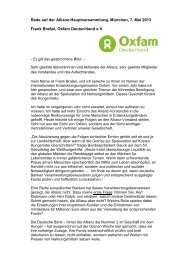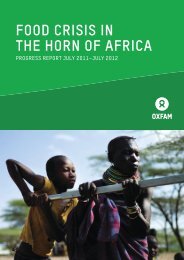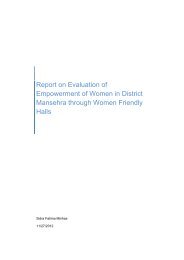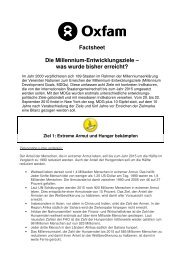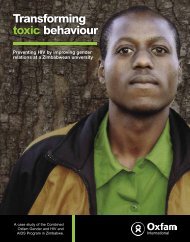No Time to Lose - Oxfam
No Time to Lose - Oxfam
No Time to Lose - Oxfam
You also want an ePaper? Increase the reach of your titles
YUMPU automatically turns print PDFs into web optimized ePapers that Google loves.
Conclusion<br />
States have been pouring money in<strong>to</strong> Afghanistan for nearly a decade.<br />
For four years in a row, ISAF has been the largest UN-mandated military<br />
operation in the world, with <strong>to</strong>tal troop numbers in 2010 exceeding<br />
the combined global <strong>to</strong>tal of all UN peacekeeping operations. 123<br />
The US alone has spent $336bn on the war since 2001. 124 But serious<br />
efforts <strong>to</strong> strengthen the professionalism and accountability of the national<br />
security forces only really began in 2009, and even then, the<br />
shift from an exclusive focus on force generation was slow <strong>to</strong> take effect.<br />
As acknowledged by NTM-A/CSTC-A, ‘before <strong>No</strong>vember 2009<br />
there … [was] a singular focus on quantity, recruitment and assignment<br />
of soldiers and police with little or no training, paying them less<br />
than a living wage, and an inability <strong>to</strong> properly develop leaders’. 125<br />
Today some 86 per cent of recruits are illiterate, 126 and the majority of<br />
the population regard the police in particular as ineffective, corrupt<br />
and abusive. Civilian casualties – likely <strong>to</strong> escalate as the ANSF assume<br />
increasing responsibility for combat operations – are not systematically<br />
tracked, analysed, investigated or compensated by the<br />
government. Vetting systems allow individuals with appalling his<strong>to</strong>ries<br />
of human rights abuses <strong>to</strong> slip through the cracks. The UN and<br />
human rights groups have documented a series of alleged violations<br />
of international human rights and humanitarian law on the part of the<br />
ANSF, including night raids carried out without adequate precautions<br />
<strong>to</strong> protect civilians, mistreatment of detainees, extra-judicial killing,<br />
and the recruitment and sexual abuse of children. But accountability<br />
is seriously lacking.<br />
The past couple of years have seen a number of positive developments.<br />
The development of codes of conduct, commitments made by<br />
the MoI in the National Police Strategy <strong>to</strong> improve accountability, the<br />
office of the police ombudsman, the revision of police training <strong>to</strong> include<br />
a greater focus on community-based policing, the establishment<br />
of the ANA legal school and a legal training program for the ANP,<br />
and structural changes in the military justice system, are all steps in<br />
the right direction. But there is a long way <strong>to</strong> go if the security forces<br />
that from July this year will gradually assume responsibility for the<br />
protection of the population are <strong>to</strong> be expected <strong>to</strong> do so in a manner<br />
that is competent, professional and accountable both <strong>to</strong> the law and <strong>to</strong><br />
Afghan civilians.<br />
As troop-contributing states prepare for a phased withdrawal of international<br />
forces in the lead up <strong>to</strong> transition, the need for appropriate<br />
structures <strong>to</strong> enhance the accountability of the national security forces<br />
is a moral, legal and political imperative. It’s not <strong>to</strong>o late; but what is<br />
required is genuine political commitment at the highest levels of civilian<br />
and military leadership, both Afghan and international, <strong>to</strong> build<br />
national security forces that Afghans can trust.<br />
31




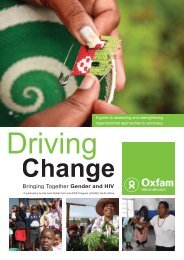

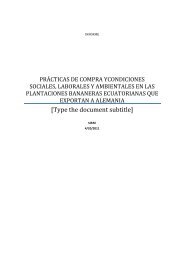
![Download: Faltposter EU-Handelspolitik [PDF 2,17MB] - Germanwatch](https://img.yumpu.com/25095854/1/190x161/download-faltposter-eu-handelspolitik-pdf-217mb-germanwatch.jpg?quality=85)
